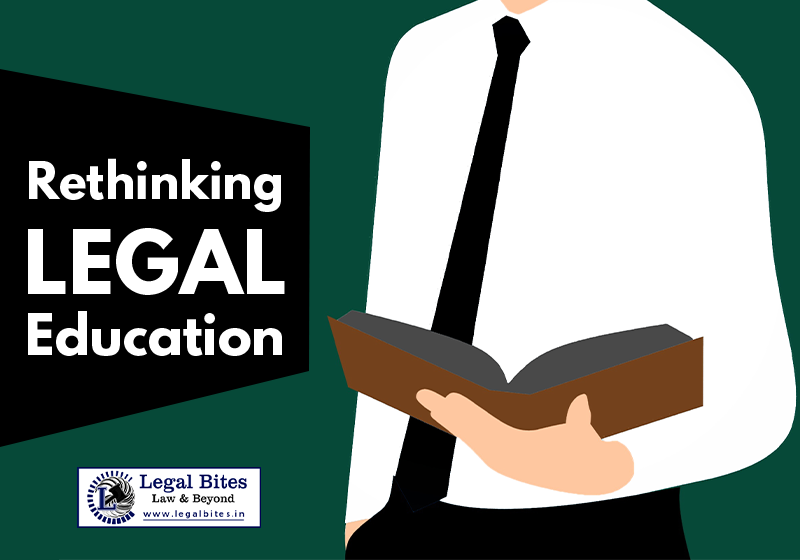Rethinking Legal Education: Why Going Back to the Past is the New Form of Dynamism?
Legal education in India has undergone several changes in the past few decades. Despite the mushrooming of a large number of law schools, becoming a lawyer hasn’t become any easier. Kaarvannan. B writes about the loopholes in the current legal education system and why he thinks it is important to take inspiration from the past to make learning more… Read More »

Legal education in India has undergone several changes in the past few decades. Despite the mushrooming of a large number of law schools, becoming a lawyer hasn’t become any easier. Kaarvannan. B writes about the loopholes in the current legal education system and why he thinks it is important to take inspiration from the past to make learning more efficient.
Does Efficient Learning have a Definite Algorithm?
“Justice ought to be served with eyes shut but Law ought not to be taught like a horse with blinkers.”
“Law School” is the most appealing word to all aspirants willing to make a mark in the legal fraternity. The term “law’ by itself is directly proportional to the concept of dynamism. Since the inception of the first Supreme Court of Judicature at Fort William, Kolkata to the last established Andhra Pradesh High Court in 2019 through the AP Reorganization Act, 2014, the walls of justice have witnessed a remarkable transformation.
Forget about becoming a successful Advocate but even the path towards enrolling in the bar is like climbing a mountain. I’m sure one can hardly deny this statement.
Now the question arises — who helps us in navigating the path towards becoming a lawyer?
Indeed, we tackle the hardships to get ourselves placed in a good internship program and understand the technicalities of this profession but the base for our profession is sculpted by the institution that we choose for pursuing our legal education. How fascinated are we to pursue our legal education from National Law Universities or the top tier creamy layer of law institutions?
Having completed my under-graduation and currently pursuing my Master’s degree, I’m still sceptical to ascertain what exactly is the right exposure that law school promises to offer during our tenure as a law student. I would leave it to the readers to answer a few unending questions:
How promising are these expert lectures provided by your law school? Are they inclined towards really benefitting the students or do you think the primary objective of every college event is to ensure an increase in the institute’s reputation?
Addressing the elephant in the room, “the attendance factor”. The scuffle for attendance is a prototypical part of a student’s life but can legal education be narrowed down to merely four walls or can it be constrained to just webinars and expert lectures? Sometimes It turns out to be a double-headed sword and I believe it defeats the ultimate purpose of learning especially in terms of legal education.
During an Under-Graduation program, students shall be allowed to decide the threshold level of their exposure in the existing legal education system and the onus of the institution is merely constrained to decide whether or not the specific exposure shall prove beneficial to the student’s career. Instead, the scheming of institutions offering a degree in Law seems to have taken a step ahead and started deciding on what exposure students are entitled to get during their course of study.
Let us take a situation at hand. Imagine there is an intersection of events and your institution is holding an expert lecture on the Civil Procedure Code and another organization is conducting a program on International Human rights. You are inclined towards international law and you would want to attend the program conducted on International Human Rights. Would you be allowed or would you be only entitled to get the exposure provided by your institution alone and sit for an expert lecture on the Civil Procedure Code?
“Students can be a catalyst to institutions’ growth but definitely not a tool. “
Have you ever imagined how scholars like Nani Palkhivala or Ram Jethmalani were nurtured by their law school? Or what do you think were the attendance policies during their tenure as a student?
I’m sure they were not forced to choose a single branch of law throughout their legal career but instead, they were given the liberty to choose what exposure they wanted to acquire in-terms of this profession.
My Views on Legal Education
The legal profession is witnessing a paradigm shift but I, as a budding lawyer, cannot ascertain if such a paradigm shift is for the good of the profession. Since time immemorial, legal education comes as a package but the dynamism in the present legal education system drives a student to choose a single cluster amongst the existing package for their entire career.
Well, that doesn’t mean I don’t subscribe to the concept of specialization through a Master’s degree. It is indeed essential to choose our area of interest but not choose a single field for our entire career.
With the least or in-fact with the zero experience I hold in terms of this profession, I believe a streamlined growth is possible only if we decide “what we don’t want instead of deciding what we want”. Choosing what we want is like wearing blinkers on ourselves, however, deciding what we don’t want shall open up several possibilities to widen our growth in the legal profession.
Legal education demands an approach that brings out the most effective and efficient product. One cannot disagree with the fact that the legal profession is a massive undertaking and letting our practice stay confined to a single branch of law defeats the ultimate object of exploring the profession.
Law comes with authority and power. Let us not confine its power simply for earning bread and butter.
It is high time we rationalise our thought process and contribute to a better tomorrow and safeguard legal sanctity.


